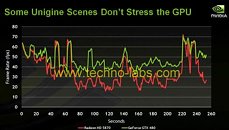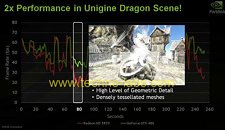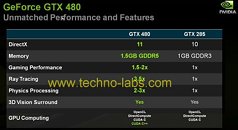- Joined
- Oct 9, 2007
- Messages
- 47,233 (7.55/day)
- Location
- Hyderabad, India
| System Name | RBMK-1000 |
|---|---|
| Processor | AMD Ryzen 7 5700G |
| Motherboard | ASUS ROG Strix B450-E Gaming |
| Cooling | DeepCool Gammax L240 V2 |
| Memory | 2x 8GB G.Skill Sniper X |
| Video Card(s) | Palit GeForce RTX 2080 SUPER GameRock |
| Storage | Western Digital Black NVMe 512GB |
| Display(s) | BenQ 1440p 60 Hz 27-inch |
| Case | Corsair Carbide 100R |
| Audio Device(s) | ASUS SupremeFX S1220A |
| Power Supply | Cooler Master MWE Gold 650W |
| Mouse | ASUS ROG Strix Impact |
| Keyboard | Gamdias Hermes E2 |
| Software | Windows 11 Pro |
A set of company slides leaked to the press reveals that NVIDIA is claiming the upper hand in tessellation performance. With this achievement, NVIDIA is looking to encourage leaps in geometric detail, probably in future games that make use of tessellation. NVIDIA's confidence comes from the way its GF100 GPU is designed (further explained here). Each GF100 GPU physically has 16 Polymorph Engines, one per streaming multiprocessor (SM) which helps in distributed, parallel geometry processing. Each Polymorph Engine has its own tessellation unit. With 15 SMs enabled on the GeForce GTX 480 and 14 on the GeForce GTX 470, there are that many independent tessellation units.
NVIDIA demonstrated its claims in the presentation using the Unigine Heaven, where the GeForce GTX 480 was pitted against a Radeon HD 5870. In many scenes where tessellation is lower, the GPUs performed neck-and-neck, with the GTX 480 performing better more often. But in scenes with heavy tessellation (particularly the "dragon" scene, where a highly detailed model of a dragon needs to be rendered with densely tessellated meshes, the GTX 480 clocks nearly a 100% performance increment over the HD 5870. NVIDIA has been confident about the tessellation performance back since January, when it detailed the GF100 architecture. The GeForce GTX 400 series graphics cards will be unveiled on the 26th of March.



Images Courtesy: Techno-Labs
View at TechPowerUp Main Site
NVIDIA demonstrated its claims in the presentation using the Unigine Heaven, where the GeForce GTX 480 was pitted against a Radeon HD 5870. In many scenes where tessellation is lower, the GPUs performed neck-and-neck, with the GTX 480 performing better more often. But in scenes with heavy tessellation (particularly the "dragon" scene, where a highly detailed model of a dragon needs to be rendered with densely tessellated meshes, the GTX 480 clocks nearly a 100% performance increment over the HD 5870. NVIDIA has been confident about the tessellation performance back since January, when it detailed the GF100 architecture. The GeForce GTX 400 series graphics cards will be unveiled on the 26th of March.



Images Courtesy: Techno-Labs
View at TechPowerUp Main Site









